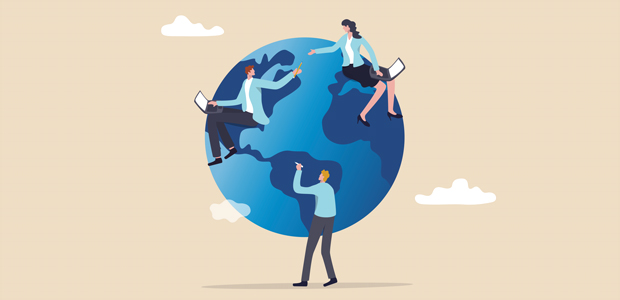
The World of Work in 2030: A Futurist’s View
As a digital layer continues to be applied across everything we do, the world we are living in will seem to get smaller. Boundaries and borders and even language hurdles will be broken down via this new digital world and time zones and currencies will become less important. Digital transformation is disrupting so many areas of our lives and over the next decade we will see it continue to advance areas such as training, learning and education.
The global education and training market is set to reach $10tn by 2030, showing just how much impact digitisation is having on this sector. This massive shift in learning and working practices will see the end of a ‘one-size-fits-all’ model with a move to a more personalised process where learning is tailored to the individual’s learning style and flair for certain subjects or areas.
The workplace will also undergo this transformation with jobs becoming less linear and more dynamic, and with technological advancements increasing in pace, workplace learning will become a necessity to keep ahead of the advanced skillsets needed. It will also become sought-after for employers to offer a continuation of learning options and we are already seeing employees are increasingly looking for an employer that values them enough to invest in their skillset and build a business that is agile and future ready.
Many companies are also realising the benefits of instilling a culture of lifelong learning in the workplace. This has been especially true over the past two years, with companies having to adapt their work styles rapidly to keep ahead of changing restrictions and consumer habits due to the pandemic.
The leaders of today recognise that there is not just value to be had in strengthening the workplace by adding new skilled employees, but also by encouraging upskilling among their current employees and equipping them with the tools to do so. By offering education platforms and corporate training opportunities, companies will become more attractive to potential employees and simultaneously engage and nurture their existing team – all of which helps to further strengthen the business.
An additional shift that companies are contending with is the newer generations coming into the workplace who have a different set of values and beliefs. These generations grew up with tech embedded in their lives, which has made them less concerned with what’s on their screen and more concerned with how these applications seamlessly connect with their real lives. This drive for a ‘real-life’ application, especially in areas such as education, combined with the online tools we all have at our disposal, is helping to fast-develop a ‘network of networks’ - individuals who are able to focus on connecting with one another and exploring and learning, all via a digital platform or application.
Workplace learning via a digital platform allows for the employee to progress through the course at a pace that suits them and with the help of AI driven algorithms it will also allow for new avenues of learning to be opened up and explored. With AI identifying and suggesting new courses, groups, events, networks and people to widen an individual’s knowledge, we will see the world becoming more connected and people far away in distance will become metaphorically closer. This will disrupt learning institutions in the same way that social media has disrupted our everyday lives. When everyone in a network is learning and sharing knowledge so rapidly, we can all benefit from improved understanding and barriers are broken down with less conflict and unconscious bias.
The past decade has seen leaps and bounds in IoT technology, AI, blockchain and AR across the globe. The world of work is just catching up with these advancements and I believe over the next few years we will see a huge surge in companies looking to equip team members with the skills that will enable them to meet these new frontiers with ease and resilience. The world of work in 2030 will demand that leaders can see the whole, global picture and encourage a new generation to help tackle the world’s social, economic, and environmental issues. All of this through knowledge, networking and digital transformation, I for one am excited for this future.

